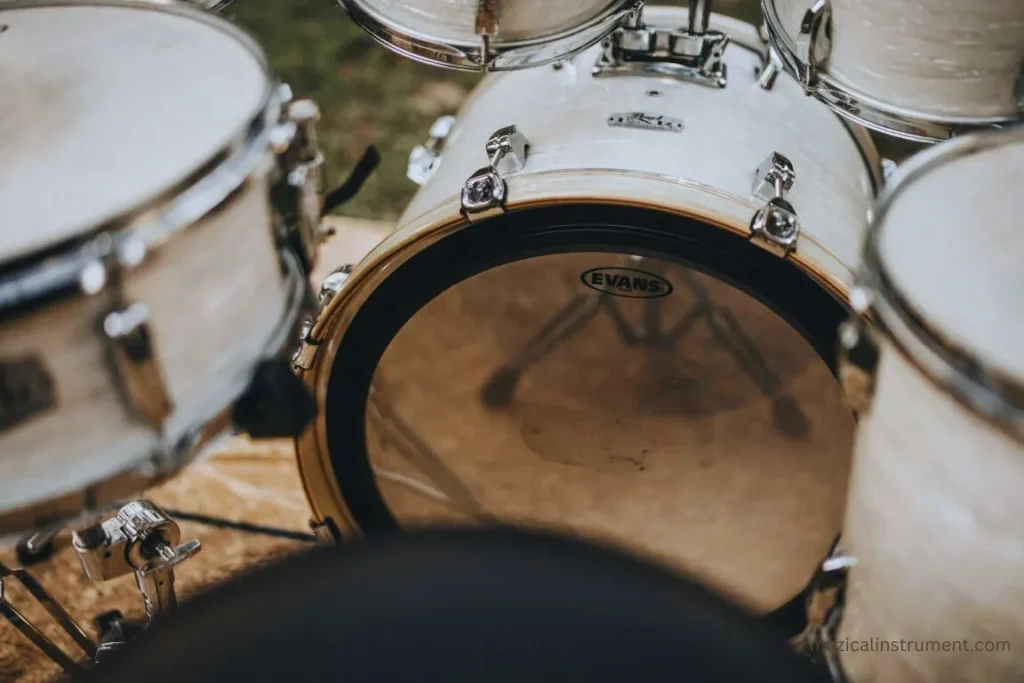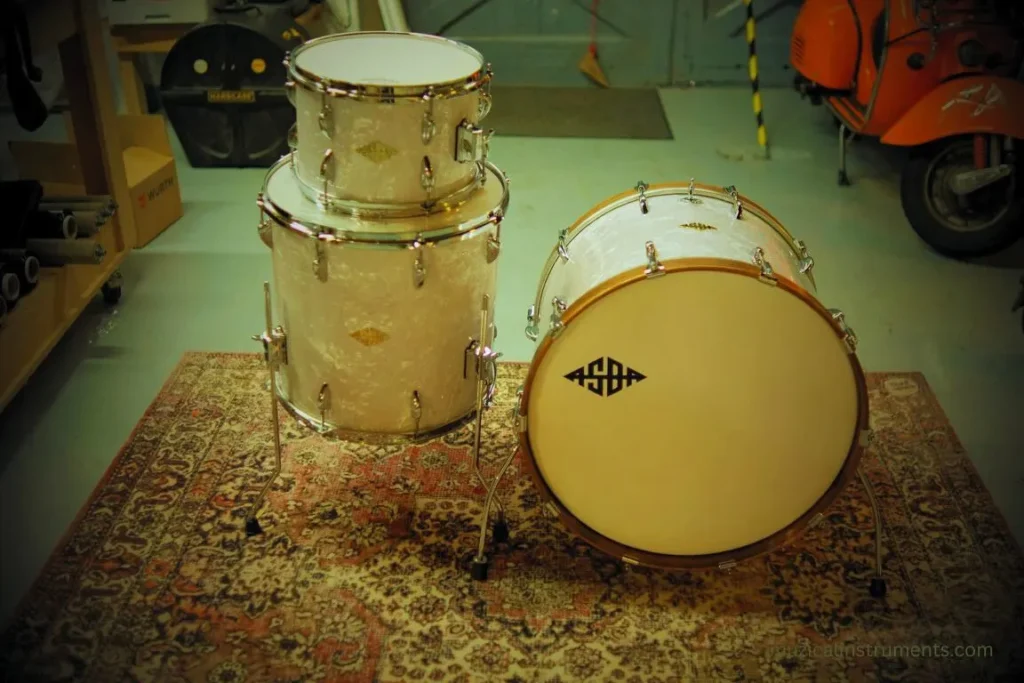What to Do With Your Damaged Bass Drum?
A damaged bass drum can ruin your sound and slow you down. Maybe the drumhead is torn, the hoops are bent, or the shell has a crack. Sometimes the small parts like lugs, tension rods, or other hardware break or get loose.
No matter the problem, you may be asking yourself: Should I fix it or just get a new one?
Don’t worry, we’ll help you figure it out. Here, you’ll learn how to check the damage, understand what can be repaired, and see when it makes more sense to replace the drum. That way, you can get back to playing without wasting time or money.
Identify the Problem: What’s Really Wrong with Your Damaged Bass Drum?
Before you can fix or replace your damaged bass drum, you need to know what’s wrong. Let’s break it down.
a. Check the Main Parts
Look closely at each part of the drum:
- Shell: Is it cracked, dented, or coming apart?
- Hoops: Are they bent, split, or out of shape?
- Drumheads: Are they torn, dented, or sound dull?
- Hardware: Check the lugs, spurs, and tension rods. Are they broken, loose, or missing?
Even small damage can affect how your drum sounds or feels when you play.

b. How Bad Is the Damage of Your Bass Drum?
Not all damage is the same. Some things are easy to fix. Others are more serious.
- Minor: Worn out drumhead, loose lugs or tension rods. These are quick fixes.
- Moderate: Warped hoops or rusty hardware. These take more work but can still be fixed.
- Severe: Cracked shell, warped drum shape, or water damage. These are big problems and might mean you need a new drum.
Knowing how bad the damage is will help you decide what to do next.
Repair: When It Makes Sense
Not every damaged bass drum needs to be replaced. Sometimes a simple fix can make your bass drum sound great again.
a. Good Times to Repair of Your Damaged Drum
You should think about fixing your drum if:
- The shell is still strong with no big cracks
- Only the drumhead is torn or worn out
- The hoops are a little bent but not broken
- The hardware (like lugs or spurs) is loose or missing but easy to replace
- The drum means a lot to you maybe it’s vintage or has sentimental value
- You’re trying to save money and don’t want to buy a new one
b. Fix It Yourself or Get Help?
Some things are easy to do on your own:
- Change the drumhead
- Tighten or replace tension rods or lugs
- Clean or oil the hardware
But for bigger problems like a damaged shell or warped hoops you may need a drum shop or a pro to help.
c. How Much Will It Cost?
Here’s a rough idea of what you might spend:
- New drumhead: $15–$30
- Hoop replacement: $40–$70
- Shell work or repainting: $150–$450
- Small parts (like lugs or rods): $5–$25 each
Fixing a drum can be much cheaper than buying a new one if the damage isn’t too bad.
Replacement: When It’s the Better Choice
Sometimes, fixing your damaged bass drum just isn’t worth it. In those cases, buying a new one is the smarter move.
a. When You Should Replace the Damaged Bass Drum
You may want to replace your damaged bass drum if:
- The shell is cracked or badly warped
- There’s water damage or mold inside the drum
- The hoops are broken and can’t be fixed
- The hardware is too rusty or missing many parts
- Fixing it costs more than getting a new drum
- You want a better sound or a new style
If your drum has too many problems or doesn’t sound right even after repairs, it’s time to move on.

b. Why a New Drum Can Be a Good Idea
Buying a new bass drum can give you:
- A cleaner, stronger sound
- Better parts and modern hardware
- Less worry about future problems
- A fresh look on stage or in the studio
- A warranty from the company
It might cost more upfront, but it can save you money and stress later.
c. What Does a New Bass Drum Cost?
Here’s what you can expect to spend:
- Beginner drum: $200–$300
- Mid-level drum: $300–$500
- Pro-level drum: $600 or more
You can also look for used drums in good shape; they’re often cheaper.
Thinking about replacing it? Here’s how to judge the value of a non-brand drum kit before you buy anything new.
Repair vs. Replacement: Side-by-Side Comparison
Still not sure what to do? Let’s make it easier. Here’s a quick look at how repair and replacement compare:
| Thing to Consider | Repair | Replacement |
|---|---|---|
| Cost | Usually cheaper ($20–$450) | Can be pricey ($200–$600+) |
| Time | May take a few days | Instant if in stock |
| Skill Needed | Some DIY work or help from a pro | No skill needed — just buy and play |
| Drum Value | Great for vintage or loved drums | Great if you want a sound upgrade |
| Risk | Might not last if damage is serious | New drum should last a long time |
Prevent Future Damage: Maintenance Tips
Taking care of your bass drum now can save you money and trouble later. Here are some simple tips to keep it in great shape:
- Clean it often: Wipe down your drum, inside and out. Dust and dirt can hurt the sound and wear down parts.
- Store it right: Keep your drum in a dry, cool place. Avoid damp spots or extreme heat.
- Use cases or pads: When moving your drum, protect it with a padded bag or hard case.
- Tune the heads carefully: Don’t crank too tight. Even tension helps avoid stress on the hoops and lugs.
- Check it monthly: Look for cracks, loose parts, or worn out hardware before they get worse.
A little care goes a long way. These steps can help your bass drum sound better and last longer.
FAQ
1. Can I fix a damaged bass drum shell myself?
If it’s a small surface crack, sure you can try wood glue and clamps. But if it’s deep or affects the sound, it’s probably best to let a pro handle it. Messing up a shell repair can make things worse.
2. My drumhead has a tear. Can I just tape it up?
You can, but it won’t sound right. Taping might work for a quick jam or practice, but for gigs or recording? Nah. A new head isn’t expensive and will sound way better.
3. Are warped hoops a big deal?
They can be. Warped hoops can mess with your tuning and even damage your drumhead. If it’s only slightly off, you might be able to bend it back. If it’s badly twisted or split just replace it.
4. How do I know if the lugs or tension rods are the problem?
If your drum won’t stay in tune or the rods keep slipping, it’s often worn lugs or stripped threads. Try swapping in a working lug from another drum if it holds, you’ve found the issue.
5. Is it ever worth replacing just the bass drum instead of the whole kit?
Yes! Especially if the rest of your kit is fine. Just make sure the new bass drum fits your style and sound. Some people even mix brands to get their perfect setup.
6. How often should I replace my drumhead?
It depends how much you play. If you play every day, maybe every 3–6 months. If it’s only now and then, it can last much longer. Look for dents, dead sound, or fraying that’s your cue.
7. How do I keep this from happening again?
Clean your drum now and then, store it somewhere dry, and always use a case or pad when moving it. Also, don’t over-tighten the heads uneven tuning can really stress the hardware and hoops.
Final Thoughts: Know What Your Drum Needs
A damaged bass drum doesn’t always mean it’s the end. Sometimes, a small repair is all it takes to get back to playing. Other times, getting a new drum is the smarter choice.
The key is to check the damage, think about your budget, and choose what works best for you. And remember taking good care of your drum now can help you avoid big problems later.
No matter what you decide, the goal is the same: keep the beat going strong.
